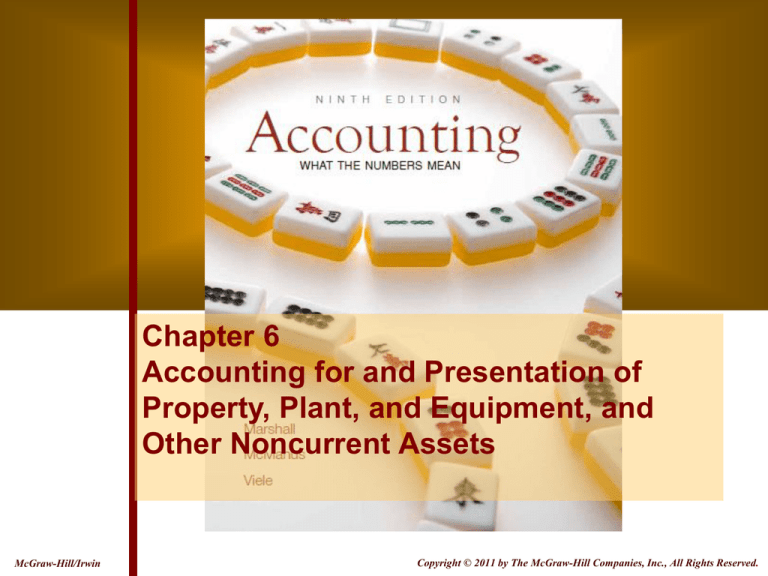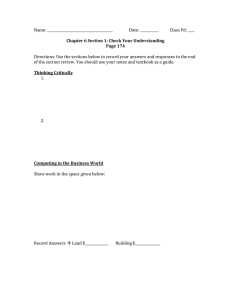
1-1
6-1
© 2008 The McGraw-Hill Companies, Inc., All Rights Reserved.
Chapter 6
Accounting for and Presentation of
Property, Plant, and Equipment, and
Other Noncurrent Assets
McGraw-Hill/Irwin
McGraw-Hill/Irwin
6-1
Copyright
2011 by The McGraw-Hill
Companies,
Inc.,Rights
All Rights
Reserved.
© 2008
The©McGraw-Hill
Companies,
Inc., All
Reserved.
1-2
6-2
Noncurrent Assets
Lan
d
Buildings
Equipment
1) Classified as assets because
they are owned by the
organization.
2) Have the ability to generate
revenue beyond one year.
Intangible Assets
Natural Resources
McGraw-Hill/Irwin
6-2
© 2008 The McGraw-Hill Companies, Inc., All Rights Reserved.
1-3
6-3
LO1
Land
Land is a nondepreciable asset.
All costs incurred to get
land ready for use are
capitalized.
Title insurance premiums
Purchase
price
Delinquent
taxes
Real estate
commissions
Razing costs
of building
on the land
Title and legal fees
McGraw-Hill/Irwin
6-3
© 2008 The McGraw-Hill Companies, Inc., All Rights Reserved.
1-4
6-4
Buildings and Equipment
LO1
All costs incurred to get an asset ready for use
are capitalized.
Purchase
price
Installation
costs
Architectural
fees
Transportation
costs
Cost of
permits
Excavation and
construction costs
McGraw-Hill/Irwin
6-4
© 2008 The McGraw-Hill Companies, Inc., All Rights Reserved.
1-5
6-5
Depreciation
LO2
Depreciation is the allocation of the cost
of an asset to the years in which the
benefits of the asset are expected to be
received. It is an application of the
matching concept.
Balance Sheet
Acquisition
Cost
(Unused)
Income Statement
Cost
Allocation
Expense
(Used)
Does not reflect decline in
value.
McGraw-Hill/Irwin
6-5
© 2008 The McGraw-Hill Companies, Inc., All Rights Reserved.
1-6
6-6
Depreciation Methods
LO3
Straight-Line Methods
Accelerated Methods
Straight-line
Sum-of-the-years’-digits
Units of production
Declining balance
Years of Life
McGraw-Hill/Irwin
Accelerated Depreciation
Annual
Depreciation
Expense ($)
Annual
Depreciation
Expense ($)
Straight-Line Depreciation
Years of Life
6-6
© 2008 The McGraw-Hill Companies, Inc., All Rights Reserved.
1-7
6-7
LO3
Declining-Balance Method
Annual Depreciation
=
Expense
Double the
Book Value at
×
Straight-line
Beginning of Year
Depreciation Rate
Since we are using
two times the
straight-line rate,
this is called the
Double-DecliningBalance Method.
McGraw-Hill/Irwin
1
Life in Years
×2
6-7
© 2008 The McGraw-Hill Companies, Inc., All Rights Reserved.
1-8
6-8
Comparing Depreciation Methods
LO3
Straight-Line
Annual
Depreciation
Annual
Depreciation
$10,000
$8,000
$6,000
$4,000
$2,000
$12,000
$10,000
$8,000
$6,000
$4,000
$2,000
$0
$0
1
2
3
4
1
5
Life in Years
2
3
4
5
Life in Years
Double-DecliningBalance
$20,000
Annual
Depreciation
Units-of-Production
$16,000
$14,000
Total depreciation at
end of useful life will be
the same regardless of
depreciation method
$15,000
$10,000
$5,000
$0
1
2
3
4
5
Life in Years
McGraw-Hill/Irwin
6-8
© 2008 The McGraw-Hill Companies, Inc., All Rights Reserved.
1-9
6-9
LO4
Depreciation for Tax Reporting
Most corporations use the Modified
Accelerated Cost Recovery System
(MACRS) for tax purposes.
MACRS depreciation provides for rapid
write-off of an asset’s cost in order to
stimulate new investment.
Salvage values are ignored
Useful lives are set by the Internal
Revenue Service
McGraw-Hill/Irwin
6-9
© 2008 The McGraw-Hill Companies, Inc., All Rights Reserved.
1-10
6-10
LO5
Maintenance and Repair
Expense
Preventative
maintenance
expenditures and
routine repair costs
are clearly expenses
of the period in
which they are
incurred.
McGraw-Hill/Irwin
6-10
© 2008 The McGraw-Hill Companies, Inc., All Rights Reserved.
1-11
6-11
LO6
Disposal of Depreciable Assets
Update depreciation
to the date of disposal.
Journalize disposal by:
Recording cash
received (debit).
Removing accumulated
depreciation (debit).
McGraw-Hill/Irwin
Recording a
gain (credit)
or loss (debit).
Removing the
asset cost (credit).
6-11
© 2008 The McGraw-Hill Companies, Inc., All Rights Reserved.
1-12
6-12
LO7
Assets Acquired by Capital
Lease
An operating
lease is an
ordinary lease
for the use of an
asset that does
not involve any
attributes of
ownership.
McGraw-Hill/Irwin
A capital lease
results in the
lessee (renter)
assuming
virtually all of
the benefits and
risks of
ownership for
the leased asset.
6-12
© 2008 The McGraw-Hill Companies, Inc., All Rights Reserved.
1-13
6-13
Buy or Lease an Asset?
LO8
Balance Sheet
Assets
Buy
=
1. Date of Acquisition
Computer
Equipment
+217,765
Income Statement
Liabilities
+
Owners'
Equity
Net
income
+217,765
Depreciation Expense
-Note Principal
Interest Expense
Balance Sheet
Lease
1. Date of Acquisition
Computer
Equipment
+217,765
2. Annual Depreciation
Accumulated
Depreciation
3. Annual Lease Payment
- Expenses
Note Payable
2. Annual Depreciation
Accumulated
Depreciation
3. Annual Lease Payment
Assets
= Revenues
=
Liabilities
Income Statement
+
Owners'
Equity
Net
income
= Revenues - Expenses
Capital Lease
Liability
+217,765
Depreciation Expense
-Lease Liability
Interest Expense
Leasing the computer is essentially the same as buying it. Both methods of acquiring the
asset yield the same economic impact and the same effect on the financial statements.
McGraw-Hill/Irwin
6-13
© 2008 The McGraw-Hill Companies, Inc., All Rights Reserved.
1-14
6-14
LO9
Intangible Assets
Noncurrent assets
without physical
substance.
Often provide
exclusive rights
or privileges.
Intangible
Assets
Useful life is
often difficult
to determine.
McGraw-Hill/Irwin
Usually acquired
for operational
use.
6-14
© 2008 The McGraw-Hill Companies, Inc., All Rights Reserved.
1-15
6-15
LO9
Goodwill
Goodwill
Occurs when one
company buys
another company.
Only ‘purchased’
goodwill is an
intangible asset.
The amount by which the
purchase price exceeds the fair
market value of net assets acquired.
McGraw-Hill/Irwin
6-15
© 2008 The McGraw-Hill Companies, Inc., All Rights Reserved.
1-16
6-16
Time Value of Money
L O 10
Future Value: the value at some future date of an investment made today.
Today
$ 1,000
1 year
2 years
3 years
Invested at 10% has a future value of
4 years
$ 1,464
Present Value: the value now of an amount
to be received or paid at some future date.
Today
$ 1,000
McGraw-Hill/Irwin
1 year
2 years
3 years
Is the present value at 10% of
4 years
$ 1,464
6-16
© 2008 The McGraw-Hill Companies, Inc., All Rights Reserved.





